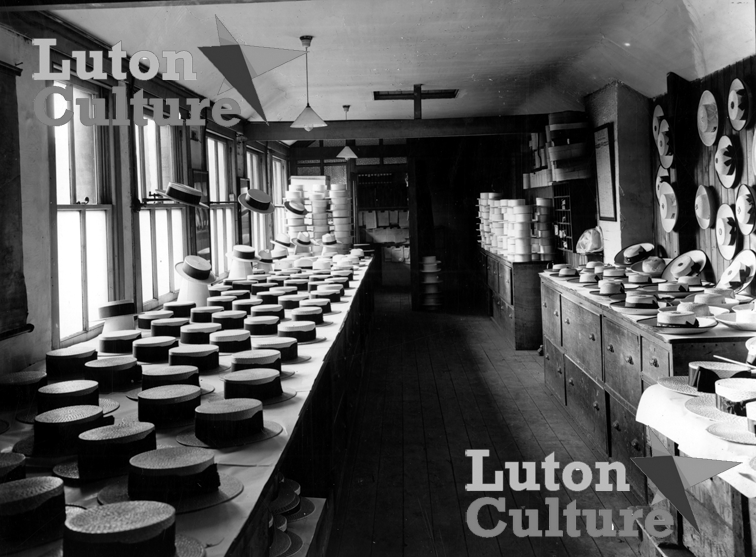The dominant questions in the minds of businessmen are the effects of this unprecedented upon the general course of trade. The straw hat industry has been affected in several ways.
 Owing to the presence of the SMS Emden [German light cruiser which was attacking Allied merchant ships, sunk November 9th, 1914] in the Indian Ocean the route to the Suez Canal was interrupted, and cargo boats from the Far East had to remain for weeks in the security of various ports.
Owing to the presence of the SMS Emden [German light cruiser which was attacking Allied merchant ships, sunk November 9th, 1914] in the Indian Ocean the route to the Suez Canal was interrupted, and cargo boats from the Far East had to remain for weeks in the security of various ports.
As our supplies of straw and hemp plaits are chiefly from the oriental countries, this produced a shortage of material, or rather an increase in value on that which was in the market. Those who had speculated heavily sold part of their stocks at enhanced prices. When it eventually reached this country there was great delay in delivering it from the docks.
We do not hear that at any time there was a real dearth of material, but the supply was limited and prices were affected accordingly. A large importer of these plaits remarked that the visible supplies, when once they reached this market, would be ample for all needs.
An important factor in the situation is that Germany is eliminated as a competitor for these materials and Paris will require less than usual, so that local requirements will be fully met. These remarks refer solely to that section of the trade engaged in the manufacture of ladies' hats.
The producers of men's hats are faced with this situation. In this country it may be assumed that a million men will be absorbed in the military operations. If three-fourths of these have been accustomed to wear straw hats in the spring or summer, they will not do so in the coming season, should the war be so far prolonged. This implies that fewer hats of this class by sixty thousand dozens will be wanted in the home market. A similar situation will exist in France and Belgium, but will affect us in a less degree.
This shortage may be compensated in some measure by an increase in the shipping trade. South America has been well worked by travellers and agents of Berlin houses, and it is probable that some of this trade will be diverted to this market, although New York will doubtless secure the lion's share.
It will be seem from the foregoing statement that the inevitable loss of trade in one direction will be in some measure counter-balanced by other phases of the situation.
During the closing month of the year there have been strenuous efforts made to capture a portion of the early spring trade. It is a far cry to the real spring season, but it is necessary to begin early, and the output of hats cannot be indefinitely increased when the rush is on. Hence the necessity of preparing stocks in advance and in doing this it is evident that matured judgement is necessary in securing correct shapes in appropriate materials.
The results of the early journeys suggest that lower priced hats will be in greater demand than usual. with a corresponding diminution in the requests for the highest priced articles. The economic situation will fully account for this.
The enormous expenditure on military operations will necessitate greatly increased taxation, so that luxuries will be curtailed, and amongst these high price must be classed, and probably two hats will be made to serve where three were used formerly.
For the opening of the season small hats of fine materials will be most in evidence. Many of these styles will be governed by military and international ideas. Scottish, French, Dutch and probably Russian features of shape and style will impress themselves upon the characters of the hats that will be placed on the market. With the advance of the season towards summer, it is probable that much larger hats than those now worn will again become fashionable.
So far as materials are concerned, plaits made from hemp are easily first. Our chief source of supply is Japan, but we obtain these goods from both Italy and Switzerland, and all these are open markets. The Swiss productions are incomparably the best, but the high prices demanded restricts considerably their use.
Fancy plaits made from artificial silk are also in favour. As the Vienna market for these is now closed, English manufacturers have turned their attention to their production, and are succeeding admirably. The prices are somewhat higher, but they will doubtless be reduced should the trade become thoroughly established.
The shipping trade with the colonies is well up to the average, but at present one does not hear of a great influx of New York buyers.
During the autumn now closed, the straw hat trade has been unusually depressed, and that for velvet hats was active. In the latter occupation Luton suffered from the severe competition of Jews in the east of London, whose prices are absurdly low.
Thanks to the efficient protection afforded by our Army and Navy, our local industry has suffered very little embarrassment from the war, and we look with hope and confidence to the continuation of favourable conditions in the New Year.
[The Luton News, December 31st, 1914]

